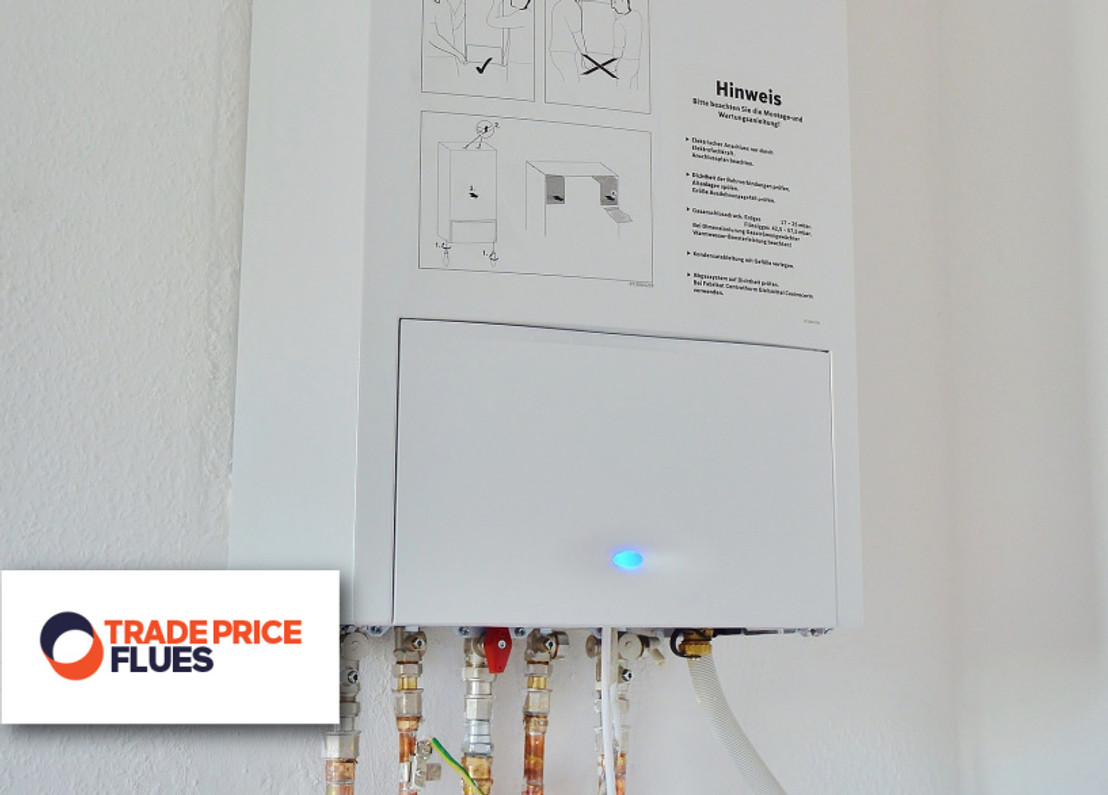What Kind of Flue Liner Do You Need for a Gas or Oil Boiler?
If you’re thinking of replacing or carrying out maintenance on your boiler, then it’s generally a good idea to replace the boiler’s flue at the same time. However, depending on what type of boiler you have, you may need a certain type of flue liner. To find out what flue liner is best for your oil or gas boiler, keep reading…
What is a boiler flue liner?
Let’s begin by defining exactly what we mean when we use the term ‘boiler flue’.
It’s important to do this as there are many types of flues out there. Simply Google the term, and you’ll be presented with multiple flues - not all of which will be suitable for use with a gas or oil boiler.
Here at Trade Price Flues, we define a boiler flue as a flue that carries the exhaust gases produced by a boiler outside the home, releasing the gases into the atmosphere.
Think of a boiler flue as being like your boiler’s chimney.
The flue liner specifically is the flexible metal liner which sits within the flue and connects the boiler’s exhaust to the outlet - providing a ‘tunnel’ for the boiler gases to pass through.
What types of boilers are there and what flue liners do they require?
An essential point to note is that there are different types of boilers in UK homes.
The three main types of boilers found in UK homes are as follows:
> Combi boilers.
> Heat only (regular) boilers.
> System boilers.
What is a combi boiler?
A combi boiler is a single, integrated unit that produces both the heating and hot water for a home. It does this directly, taking cold water from the mains, heating it up, and then sending the hot water straight to the home’s taps and radiators without an intervening hot water storage tank.
Because of the way they operate, combi boilers are very economical and as such are among the most common types of boiler found in UK homes.
The majority of combi boilers in the UK are gas-fired (approximately 85% of UK homes are connected to the UK gas network), however it’s also possible to buy oil-fired combi boilers.
What flue liner do you need for an oil or gas-fired combi boiler?
The exact model of combi boiler you have, and where it is located in your home, will determine what type of flue you require.
If your combi boiler is located against an external wall, then the flue will exit horizontally through the wall behind the boiler. This type of flue is usually a short pipe made from an appropriate stainless steel.
If your combi boiler is notlocated against an external wall - and is located somewhere else within your home - then the flue will generally exit vertically, through the roof.
In the latter instance, you will need to create a vertical flue, using an appropriate flue liner and accompanying components such as clamp plates and terminals.
Whether your combi boiler is oil or gas fired, you will need to make sure the flue liner in your vertical flue is made of the appropriate material. Here at Trade Price Flues, we recommend buying a flue which is made from 316-grade stainless steel. This grade of steel will be able to handle the temperatures generated by the boiler and is also highly resistant to corrosion.
What is a heat only (regular) boiler?
Heat only (also known as ‘regular’ or ‘conventional’) boilers are an older form of boiler technology.
Regular boilers work in conjunction with two water tanks. One is a cold water tank (which is usually located in the attic), whilst the other is a hot water tank.
Regular or conventional boilers operate as follows; when the boiler is turned on (typically via a pre-programmed timer or thermostat), cold water is drawn down from the cold water tank into a heat exchanger.
As the oil or gas in the boiler burns, heat is transferred via the heat exchanger to the water. Once the water has heated up, it is pumped into the hot water tank. This hot water is then used throughout your home during the course of the day (e.g. in your radiators).
What flue liner do you need for a gas or oil-fired heat only boiler?
Like combi boilers, the flue you require for a heat only boiler will be mainly determined by where the boiler is located in your home.
If the heat only boiler is located against an external wall of your home, then you’ll need to use a horizontal flue, which will exit directly out of the back of the boiler through the wall.
If your heat only boiler is not located against an external wall - but is situated somewhere in the middle of your home - then you’ll need to construct a vertical flue, using an appropriate flue liner (and accompanying components) which will exit out of the roofline.
You’ll want to ensure you are using a 316-grade stainless steel liner. 316-grade stainless steel is able to handle the temperatures generated by burning oil and gas, and is also resistant to corrosion.
What is a system boiler?
System boilers are very similar to heat only boilers in that both types of boiler use a hot water tank to store the hot water they generate.
However, system boilers differ from heat only boilers in that they source the cold water they need directly from your home’s cold water supply. This differs from heat only boilers, which draw their water from a cold water tank.
System boilers can be either oil-fired or gas-fired, and depending on the model will heat the cold water using either a heat exchanger or a closed hot water system. Like heat only boilers, system boilers will normally fire up based on a pre-programmed timer or thermostat.
What flue liner do you need for a system boiler?
Like the other boilers detailed in this article, the flue required for a system boiler will be determined by the boiler’s location in your home.
If your system boiler is against an external wall, then use a horizontal flue.
If your system boiler is notlocated against an external wall - and is within the centre of your home somewhere - then you’ll need to construct a vertical boiler flue using a vertical flue liner and accompanying components.
Should your system boiler be either gas-fired or oil-fired, then you’ll need to use a 316-grade flue liner in your vertical boiler flue. This is because 316-grade stainless steel has the appropriate characteristics to withstand the heat generated by burning oil or gas.
Condensing vs non-condensing boilers
Another point to consider when it comes to selecting a flue liner for your boiler flue, is whether your boiler is condensing or non-condensing.
By law, every new boiler that’s installed in the UK - be it a combi boiler, a heat only boiler, or a system boiler - must be a condensing boiler.
Condensing boilers have a larger heat exchanger and use the heat from the gases exiting the boiler to heat the cold water that is entering the boiler. As such, the flue (and flue liner) you select must be compatible with this system and allow the necessary condensing to occur.
Because condensing boilers utilise the heat that would otherwise escape into the atmosphere (in a non-condensing boiler), they are highly energy efficient.
Here at Trade Price Flues, all of our oil and gas boiler flue liners are compatible with both condensing and non-condensing boilers.
How do I know if I have a condensing boiler?
If you’re not sure if you have a condensing or non-condensing boiler in your home, then there are few ways to find the answer:
> Look at the manufacturer’s instructions! This is an obvious point, but the instruction manual that came with your boiler should specify whether your boiler is condensing or non condensing.
> Check the age of your boiler. If your boiler is gas-fired and was installed after 1st April 2005, it should be a condensing boiler. If your boiler is oil-fired and was installed after 1st April 2007, it should be a condensing boiler.
> Check the emissions from your boiler when it’s operating. If you can’t see any emissions from your boiler's flue, then it will be condensing. Likewise, if the emissions you see from the flue are white, it will be non-condensing.
However, as we mentioned earlier, if you buy a boiler flue liner from Trade Price Flues, it doesn’t matter whether your boiler is condensing or non-condensing.
What are the best oil and gas boiler flue liners?
When you’re going to the effort of constructing a vertical boiler flue in your home, you want to use the best possible flue liner.
Not only do you need to use a liner which is compatible with your boiler’s fuel (e.g. gas or oil), but you want one that’ll offer a long service life.
Those are exactly the sort of boiler flue liners that we offer here at Trade Price Flues.
Flexible Flue Liners for Condensing and Non-Condensing Boiler Flues

Shop Now - Flexible Flue Liners for Condensing and Non-Condensing Boiler Flues
Our boiler flue liners are suitable for oil-fired and gas-fired boilers alike, and are manufactured using high-quality 316-grade stainless steel.
They also come with a 10-year guarantee, meaning they’ll provide a long service life. In addition, our boiler flue liners are fire rated to T1000 and are available in the following diameters:
> 4-inch (100 mm).
> 5-inch (125 mm).
> 6-inch (150 mm).
> 7-inch (175 mm).
> 8-inch (200 mm).
Our boiler flue liners are also available in multiple lengths from 5 metres up to 20 metres, making it easy to select a liner that’ll fit not only your boiler’s exhaust outlet, but will reach to the top of the flue.
We also stock a range of boiler flue components including clamp plates, terminals, and hanger rain caps.
Looking for a flue liner for your boiler flue?
Then you’re in the right place! At Trade Price Flues, we keep a huge range of boiler flue liner and boiler flue components and accessories in stock. We also offer nationwide delivery, with free delivery on all orders over £150.
Plus, if you have any questions about our boiler flues, our friendly experts will be happy to help! You can reach us at: sales@tradepriceflues.co.uk.
Shop flexible flue systems for boiler flues now
For more boiler, chimney and flue advice, read the Trade Price Flues blog…
What Is a Boiler Flue and How Does It Work? | UK Gas Boiler Ban 2025: What You Need to Know | Do You Need a Chimney Cowl on Your Chimney?
Latest Articles
-
Air Pollution Down in the UK Despite Record Wood Burner Sales
Great news! Wood-burning stoves, once considered environmental villains, have transformed into eco-f …18th Apr 2024 -
A Guide to Stove Installation in Lodges, Sheds, and Shepherd’s Huts
Shepherd’s huts, lodges, and sheds have become increasingly popular as charming retreats or alternat …25th Mar 2024 -
Pinned vs. Pinless Moisture Meters: Which is Best for Firewood?
When you collect or buy firewood, it usually starts very moist inside. Using sopping wet wood to bur …4th Mar 2024






